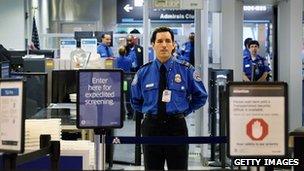Boarding pass barcodes 'can be read by smartphones'
- Published

PreCheck allows some passengers to avoid having to remove their belts and shoes at security checks
A vulnerability in US domestic airline boarding pass barcodes could allow travellers to bring unauthorised items on board, says a security expert.
The codes reveal what kind of airport checks a passenger will face and can be read by smartphones, he says.
It could undermine the US's PreCheck system which randomly decides which frequent fliers can skip part of the pre-boarding security process.
The barcodes could allow passengers to work out if they had been picked.
Selected travellers are able to avoid having to remove their shoes, jackets and belts. In addition they are allowed to leave their laptops and toiletries in their bags.
Unencrypted codes
The security information on the barcodes is only meant to be decoded by Transportation Security Administration (TSA) officers, so it was not thought to be a problem that PreCheck selected which users would get a less rigorous safety check in advance.
The fact that passengers can use their handsets to find out if they have been picked poses a problem, says Christopher Soghoian, principal technologist at the American Civil Liberties Union.
"The disclosure of this information means that bad guys are not going to be kept on their toes anymore," he said.
The security issue was publicised by aviation blogger John Butler, external, but had been discussed in specialist online forums since last summer.
"The problem is, the passenger and flight information encoded in barcode is not encrypted in any way," wrote Mr Butler.
"Using a website I decoded my boarding pass for my upcoming trip.
"It's all there PNR [passenger name record], seat assignment, flight number, name, etc. But what is interesting is the bolded three on the end. This is the TSA PreCheck information. The number means the number of beeps. 1 beep no PreCheck, 3 beeps yes PreCheck."
The US Transportation Security Administration (TSA) did not respond to a BBC request for a statement, but has previously said: "TSA does not comment on specifics of the screening process, which contain measures both seen and unseen. In addition, TSA incorporates random and unpredictable security measures throughout the travelling process."
Encryption issues
Mr Soghoian told the BBC that information about how to make sense of the boarding pass codes had been documented in the International Air Transport Association's (IATA) implementation guide.
"Thousands of people have reported being able to get the information using their phones," he added.
There are two ways to become eligible for the PreCheck system.
Passengers can pay $100 (£62) to the US customs agency which then performs a background check. If the passenger is approved it gives him or her the right to use all of the US airlines' PreCheck systems for five years.
Frequent fliers could also be invited by an airline to use the system for free.
"You have to be in the system first before they let you to potentially be eligible to skip the standard line," said Mr Soghoian.
"But if you scan the barcode, you can tell 24 hours before you get to the airport that you are not going to undergo a regular search.
"On some random occasion you'll be sent to the other line anyway - and it was meant to keep terrorists on their toes - but not anymore."
Security firm Sophos said the revelation was "very worrying".
"No one should be able to tell in advance what level of security screening they will be receive before an air flight," said the firm's senior technology consultant Graham Cluley.
"The risk is that potential attackers could determine in advance which of them is going to be given the weakest screening - and get them to attempt to carry unauthorised item onboard.
"Potential attackers should not be given advance warning of the security measures they will be facing."
- Published19 October 2012
- Published8 May 2012
- Published26 April 2012